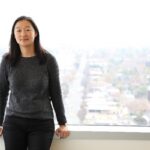Five Examples of Gen Z Innovators Tackling Social Isolation
How might you pivot your work to help end social isolation and loneliness? Listen to the wisdom of elders and youth.

Innovation is often a response to crisis, and this pandemic is no exception.
In the spring of Aditi Merchant’s freshman year at the University of Texas at Austin, the entire country began shutting down. Aditi should have been filling her time with mind-expanding classes, all-night study sessions, fun parties, and summer plans. But instead, she told me, her world turned upside down. And faced with this changed world, she wanted to do something. She wanted to be involved. She wanted connection.
“I felt helpless sitting at home,” she recalls, “all of a sudden without mentors or community connection, unable to physically volunteer, donate, or do anything to help remedy the situation.”
Helpless didn’t last long.
Last March, shortly after the shutdown, Aditi joined forces with UT freshman Allen Zhou and his younger brother, Anthony, to launch Big & Mini, a virtual platform that combats loneliness and loss of connection by matching college students and older adults in meaningful, mutually beneficial conversations by video.
Big & Mini started out as a simple Google form and a landing page, with matches made manually via email. Today, it’s a robust platform with 1,500 active users across eight colleges, 14 organizations, and 25 countries.
Innovation is often a response to crisis, and this pandemic is no exception. Aditi and a growing number of young people find themselves, perhaps for the first time, empathizing with socially isolated older adults. And they’re responding with what Gen Z does best: mobilizing their peers to action.
In a country where 61% of people report feeling lonely, these Gen Z innovators are leading the way with human-centered, tech-enabled solutions, showing us how to build bridges across generations, even in the midst of crisis.
Calling these young people the leaders of tomorrow is, well, wrong. They’re leading today—and we have so much to learn from them. Here are five things they’ve taught me… so far.
1. Look to elders for inspiration.
Like me, Aditi and her cofounders are the children of immigrants with deeply rooted respect for the role of elders. They typically have formative (but often virtual) relationships with grandparents overseas and a longing to be part of an authentic system of mutual care and support across generations.
When Aditi started feeling socially isolated, her mind naturally went to the older adults in her life who were likely experiencing the same loneliness. She missed her grandmother, an entrepreneur back in Mumbai who always encouraged her to not let others hold her back. She missed Mr. Becker, a neighbor she met while volunteering at a senior living community in high school, who told her stories of growing up in West Germany.
These cross-generational relationships were a source of inspiration to Aditi throughout her childhood, and she began to want that for everyone. “I always believed that the kindness and advice I had been given from older generations was something that everyone should experience.”
Aditi, Allen, and Anthony didn’t have to look far to come up with a solution that is deeply aligned with who they are, what they know, and how they want to live. But no matter the problem, we can all look to elders for motivation, inspiration, and encouragement.
2. Jump in quickly with a concrete test.
Gaby Li, another Gen Z social entrepreneur, is a cellist and student at Stanford studying human biology who lost her grandmother just as Covid-19 shut down the country. Their last interaction? A cello performance of “Amazing Grace” by phone.
As she grieved the loss of her grandmother, Gaby wondered how the other residents at her grandmother’s senior home were doing and thought about the joy and connection musical concerts could bring to their lives. Last spring, she launched Virtual Companions to help youth and older adults bond over activities her grandmother enjoyed, including conversation, community service, and the arts.
To get the project off the ground, Gaby started with a simple test. She tried to coordinate a Zoom streaming of Stanford Medicine’s Stuck@Home Concert for a group of older adults, but quickly learned that their lack of access to technology made the task nearly impossible.
After talking to a number of nursing homes to better understand their constraints, Gaby made a decision to lower the barriers to entry by starting with low-tech phone calls instead, pairing older and younger participants for conversations based on shared interests and offering pre-recorded concerts over YouTube to reduce complexity.
Over time, Virtual Companions has expanded to include an intergenerational pen pal program, a craft and card-making exchange, intergenerational service projects, and, yes, live virtual concerts, made possible in part by loaning tablets to residents.
Designing a concrete, easily implemented test early on gave Gaby real-time feedback that led to a more realistic and more personal solution.
3. Make asset-based design fundamental to your approach.
Everyone has something to offer, and yet so many social programs are one-way streets—people with skills helping people with needs.
Two years ago, Zachary Wang and Simar Chadha, both juniors at the time at Cherry Creek High School in Denver, launched Generation Tech to mobilize high school volunteers to teach tech skills to isolated older adults. But Zach and Simar saw early on that the high school volunteers in their program got as much out of the relationship as the older adults. While young people helped older ones become more connected to the world through technology, elders helped high schoolers better understand that world.
So instead of simply providing transactional “geek squad”-style tech support, Zach and Simar created a two-way intervention, intentionally designing Generation Tech to be a deeply human-centered effort focused on mutual discovery and learning. Student volunteers are trained to develop sustained one-on-one relationships over time. They then make weekly visits to the same senior residents, getting to know their names and stories, developing close relationships in the process. Those relationships are the heart of the program.
“While I may be there to help older adults adapt to newer technology, those same older adults are able to provide me with information that I couldn’t get anywhere else,” says Simar. “When I leave a center, I am always walking away with more knowledge and experience.”
4. Lead in community from the start.
None of these Gen Z founders are lone rangers. Their approach to leadership and staffing looks more like community organizing, with an emphasis on shared power and strong volunteer networks. The result: diverse ideas, rapid growth, and built-in succession planning from the get-go. Plus, it’s less lonely!
These leaders are intuitively collaborative, often merging efforts with others doing similar work rather than competing for limited resources. Virtual Companions, for example, was initially anchored in Gaby’s passion to connect the generations through music. But when she discovered that a classmate of hers was thinking about starting an intergenerational pen pal project and that another was playing around with the idea of using craft and card-making to connect people during the pandemic, she joined forces with them to offer multiple points of entry—and engagement—for their participants.
Today, Virtual Companions is led by 15 college students from universities across the country. Together, they handle programs, outreach, media and marketing, technology, and fundraising. Gaby hasn’t met most of them in real life, but their shared commitment to create meaningful intergenerational connections has helped them forge a tight-knit team that has already expanded beyond California to Colorado, Illinois, Connecticut, and Virginia.
5. In this era of generational divides, offer a counternarrative of generational connection.
This past June, Aditi’s team at Big & Mini matched Jo Louise, an 86-year-old “Big” from Reston, Virginia, with Rhiannon, a 19-year-old, first-generation American “Mini” taking pre-med courses at the University of Texas.
The two women immediately bonded over their mutual love of animals and art and now consider each other close friends. Rhiannon describes Jo Louise as caring and compassionate and hopes to follow in her footsteps with a Mini of her own someday. Jo Louise describes Rhiannon as the “joy in my life.”
Big & Mini is tracking hundreds of success stories like this one, as they assess their impact (so far, nine out of 10 participants report feeling more connected as a result of the intervention) and pitch their organization to media outlets, like the TODAY Show.
Their unexpected stories of connection offer us all hope in this moment, in one another, and in our shared future.
“In five years,” Aditi says, “I hope that we’ve revolutionized how seniors and youth connect. I want Big & Mini to be in every college and senior living community in America, working to bring generations together.”
In five years, she’ll be 24.
You might also like:
- Moving Beyond Performance: Making DEI Actionable
- Can You Hear Us Now? Using Feedback to Create Community-Centered Services
- The 3 ‘Rs’ of Equitable Community Engagement
- Four Ways to Remove a Board Member
- Link Arms to Elevate Your Nonprofit’s Impact
You made it to the end! Please share this article!
Let’s help other nonprofit leaders succeed! Consider sharing this article with your friends and colleagues via email or social media.
About the Author
Eunice Lin Nichols (she/her/hers) is obsessed with bringing older and younger generations together to solve society’s greatest challenges, creating a better future for all. She is vice president of innovation at Encore.org, runs the Gen2Gen Innovation Fellowship, and hosts community events like this recent post-screening conversation of The Antidote with Derenda Schubert and DeAmon Harges.
Previously, Eunice led The Purpose Prize (now a program of AARP), which has awarded over $5 million in prizes to nearly 100 social entrepreneurs over the age of 60 since 2006. She also spent 11 years leading a portfolio of statewide encore initiatives for Aspiranet to expand the social contributions of older adults in California, including scaling Experience Corps from one neighborhood school in San Francisco into a thriving Bay Area program and launching a series of initiatives that placed encore career seekers in direct service, coordination, and executive-level roles.
Eunice has been recognized as a Next Avenue Influencer in Aging and is a graduate of the inaugural class of the Billions Institute Fellowship for Large-Scale Change. In 2019, she received the James Irvine Foundation Leadership Award for advancing innovative and effective solutions to California’s most significant issues.
Articles on Blue Avocado do not provide legal representation or legal advice and should not be used as a substitute for advice or legal counsel. Blue Avocado provides space for the nonprofit sector to express new ideas. The opinions and views expressed in this article are solely those of the authors. They do not purport to reflect or imply the opinions or views of Blue Avocado, its publisher, or affiliated organizations. Blue Avocado, its publisher, and affiliated organizations are not liable for website visitors’ use of the content on Blue Avocado nor for visitors’ decisions about using the Blue Avocado website.







